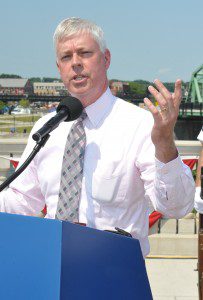WESTFIELD – The Patrick administration announced last week a new grant program to cut energy costs and reduce emissions at municipal drinking water and wastewater treatment facilities, the second largest municipal energy consumer.
The $1.5 million program is a collaboration among the Department of Energy Resources (DOER), Massachusetts Department of Environmental Protection (MassDEP) and Massachusetts Clean Energy Center (MassCEC). The program will provide gap funding to implement shovel-ready clean energy projects at these facilities, reducing municipal energy costs and cutting greenhouse gas emissions.
“Water and wastewater treatment facilities are not only among the largest municipal energy consumers, they are also among our most important resources for protecting public health and the environment at the local level,” said Energy and Environmental Affairs (EEA) Secretary Rick Sullivan. “By providing funds to reduce energy usage and costs at these facilities, this new program exemplifies the type of synergy Governor Patrick had in mind when he grouped energy and environment under a single secretariat.”
Water Resource Superintendent Dave Billips said this morning the department is investigating the details of the grant program announced Friday to determine if the city has projects at or nearing the “shovel-ready” requirement of the grant.
“It’s something they just passed, something you’d have to apply for going forward,” Billips said. “We always look at these grant. We always have projects.
“We do have a couple of projects in the planning stage for both the water division and the wastewater division,” Billips said. “We are planning to upgrade blowers and dewatering equipment with something more energy-efficient.”
“We also have a couple of projects in the planning stage to loop water lines, but we’ll have to find out if that type of work qualified for the grant funding,” Billips said.
“My team continues to work across the Commonwealth to help municipalities adopt clean energy practices at the local level,” said DOER Commissioner Mark Sylvia. “These funds will help expedite clean energy projects, leading to cost savings that can ultimately be reinvested in the facility’s assets and save taxpayer dollars.”
Projects will be funded through the Massachusetts Clean Energy Center (MassCEC) and Alternative Compliance Payment (ACP) funds. ACPs are made by electricity suppliers that do not meet their statutory Renewable Portfolio Standard obligation to purchase a sufficient percentage of renewable energy. ACP funds are allocated by DOER each year.


